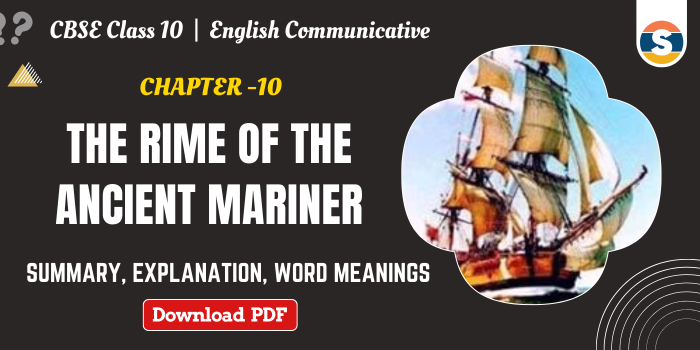By Ruchika Gupta
CBSE Class 10 English Chapter 10 The Rime of the Ancient Mariner Summary, Explanation along with Difficult Word Meanings from Literature Reader (Communicative) Book
The Rime of the Ancient Mariner Summary of CBSE Class 10 English poem followed by detailed explanation of the poem along with meanings of difficult words and literary devices used in the poem. Also, the Summary is followed by an Explanation of the lesson.
- The Rime of the Ancient Mariner Summary Part 1
- The Rime of the Ancient Mariner Summary Part 2
- The Rime of the Ancient Mariner Previous Year Questions with Model Answers PDF
- Class 10 The Rime of the Ancient Mariner Summary in Hindi
- The Rime of the Ancient Mariner Explanation
- The Rime of the Ancient Mariner Literary devices
- The Rime of the Ancient Mariner FAQs
Related:
- The Rime of the Ancient Mariner (important) Question and Answers
- Character Sketch of Mariner, Wedding Guest and Albatross Bird | The Rime of the Ancient Mariner
- The Rime of the Ancient Mariner MCQ
- The Rime of the Ancient Mariner Previous Years Question with Answers
The Rime of the Ancient Mariner PDF Download here
Author: Samuel Taylor Coleridge
The Rime of Ancient Mariner Summary
The Rime of Ancient Mariner Summary of the Chapter is given below:
A group of wedding guests was on its way to a wedding feast when one of them was stopped by an old sailor. He was eager to tell him his story. The sailor insisted upon it and the guest was forced to stay back and listen to his story.
The mariner began his story that how their ship sailed from the harbour on a happy note. They had a smooth journey for a short period of time after which a storm drove their ship southwards towards snow and mist. The ship got stuck in the lifeless region with huge masses of ice surrounding it. The ice made thunderous sounds as it cracked.
At this point of time an Albatross came flying through the mist. It was treated to be a noble soul, a holy messenger of God. With its arrival the snow cracked and gave way to the ship which once again started sailing.
The holy bird accompanied the ship, and was fed by the crew. A favourable south wind blew which drove the ship out of the cursed land of snow and mist. The sailors thanked the bird as it was a good omen for them.
The wedding guest noticed that the sailor’s face suddenly turned sad. The sailor answered his curiosity that in a spur of the moment, with his crossbow, he had shot the bird dead.
His fellow sails men blamed and cursed him for killing the holy bird but later they felt that he was right in killing the bird which had brought the fog and mist.
For some time, the ship kept on sailing smoothly towards the north. Suddenly, the wind stopped blowing and the ship came to a standstill.
Rime of the Ancient Mariner Summary Part II CBSE Class 10 English Lesson
Gradually, their stock of drinking water finished and although there was water all around them, they did not have a single drop to drink. The sea was so quiet that it seemed to rot, and ugly creatures moved on its surface. They felt that the bird’s soul had followed them to take revenge. Their mouths were so dry that they were unable to speak. All the crew stared at the mariner with hatred. They removed the cross which he wore around his neck and hung the dead Albatross in its place to signify his sin and guilt.
The poem is based on the theme of sin and redemption. After the ancient mariner commits a sin by killing the albatross, guilt hounds him in the form of strange natural and supernatural phenomena. During one terrifying experience, he has a change of heart and repents his wrongdoing. He carries out a penance, which is to travel the world to tell his tale to strangers.
The Rime of the Ancient Mariner Previous Year Questions with Model Answers PDF
Download the previous year questions of the Lesson The Rime of the Ancient Mariner of class 10 (Communicative) for free. With the help of this, you can prepare for the exam.
To Download The Rime of the Ancient Mariner Previous Year Questions with Model Answers- Click Here
The Rime of the Ancient Mariner Summary (in Hindi)
शादी में मेहमानों का एक समूह शादी की दावत के लिए जा रहा था, तभी उनमें से एक को एक बूढ़े नाविक ने रोका। वह उसे अपनी कहानी बताने के लिए उत्सुक था। नाविक ने इस पर ज़ोर दिया और मेहमान को वहीं रुककर उसकी कहानी सुनने के लिए मजबूर होना पड़ा।
नाविक ने अपनी कहानी शुरू की कि कैसे उनका जहाज बंदरगाह से ख़ुशी के साथ रवाना हुआ। थोड़े समय के लिए उनकी यात्रा सुचारू रही जिसके बाद एक तूफान ने उनके जहाज को दक्षिण की ओर बर्फ और धुंध की ओर धकेल दिया। जहाज़ उस निर्जीव क्षेत्र में फंस गया जिसके चारों ओर बर्फ का विशाल ढेर था। बर्फ टूटते ही गड़गड़ाहट की आवाजें आने लगीं।
इसी समय एक अल्बाट्रॉस धुंध में उड़ता हुआ आया। इसे एक महान आत्मा, ईश्वर का पवित्र दूत माना जाता था। इसके आगमन के साथ ही बर्फ टूट गई और जहाज को रास्ता मिल गया जो एक बार फिर चलना शुरू कर दिया।
पवित्र पक्षी जहाज के साथ था, और चालक दल द्वारा उसे खाना खिलाया गया था। एक अनुकूल दक्षिणी हवा चली जिसने जहाज को बर्फ और धुंध की शापित भूमि से बाहर निकाल दिया। नाविकों ने पक्षी को धन्यवाद दिया क्योंकि यह उनके लिए एक अच्छा शगुन था।
बारात में आए मेहमान ने देखा कि नाविक का चेहरा अचानक उदास हो गया। नाविक ने उसकी जिज्ञासा का उत्तर दिया कि क्षण भर में, उसने अपने क्रॉसबो से पक्षी को मार डाला था। उनके साथी नाविकों ने पवित्र पक्षी को मारने के लिए उन्हें दोषी ठहराया और शाप दिया, लेकिन बाद में उन्हें लगा कि उन्होंने उस पक्षी को मारकर सही किया था जो कोहरा और धुंध लेकर आया था।
कुछ देर तक जहाज उत्तर की ओर सुचारू रूप से चलता रहा। अचानक हवा चलना बंद हो गई और जहाज रुक गया।
धीरे-धीरे, उनके पीने के पानी का भंडार ख़त्म हो गया और हालाँकि उनके चारों ओर पानी था, लेकिन उनके पास पीने के लिए एक बूंद भी नहीं थी। समुद्र इतना शांत था कि वह सड़ता हुआ प्रतीत होता था, और बदसूरत जीव-जंतु उसकी सतह पर घूमते रहते थे। उन्हें लगा कि पक्षी की आत्मा बदला लेने के लिए उनके पीछे आई है। उनके मुँह इतने सूखे थे कि वे बोल पाने में भी असमर्थ थे। सभी दल नाविक को घृणा की दृष्टि से देखने लगे। उन्होंने उसके गले में पहना हुआ क्रॉस हटा दिया और उसके पाप और अपराध को दर्शाने के लिए मृत अल्बाट्रॉस को उसके स्थान पर लटका दिया।कविता पाप और मुक्ति के विषय पर आधारित है। प्राचीन नाविक द्वारा अल्बाट्रॉस को मारकर पाप करने के बाद,
अजीब प्राकृतिक और अलौकिक घटनाओं के रूप में अपराधबोध उसे परेशान करता है। एक भयानक अनुभव के दौरान, उसका हृदय परिवर्तन हो जाता है और उसे अपने गलत काम पर पछतावा होता है। वह एक तपस्या करता है, जिसका अर्थ है अजनबियों को अपनी कहानी बताने के लिए दुनिया भर की यात्रा करना।
Top
The Rime of the Ancient Mariner Poem Explanation
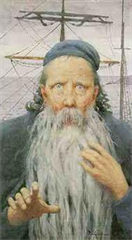
Part I
Poem
It is an ancient Mariner,
And he stoppeth one of three.
‘By thy long grey beard and glittering eye,
Now wherefore stopp’st thou me?
Word Meaning
Ancient: belonging to the olden times
Mariner: sailor
Stoppeth: stopped
Thy: your
Glittering: shining brightly, with flashing points of light
wherefore: why
stopp’st: stopping
thou: you
Explanation of the above poem – An old sailor stopped one person out of a group of three. The person said that the sailor had a grey – coloured beard and shining eyes. He asked him that why had he stopped him.
Poem
The bridegroom’s doors are opened wide,
And I am next of kin;
The guests are met, the feast is set:
May’st hear the merry din.’
Word Meaning
Bridegroom: the boy who is getting married
kin – members of your family
may’st: may
din: sound of the wedding songs
Explanation of the above poem – The person was going to a wedding. He said to the sailor that the doors of the bridegroom’s house had been opened which indicated that the ceremony was about to begin. As he was a family member, he was in a hurry. All the guests had already arrived and the dinner had been laid. The wedding music could also be heard.
Poem
He holds him with his skinny hand,
“There was a ship,” quoth he.
‘Hold off! unhand me, grey-beard loon!’
Eftsoons his hand dropt he.
Word Meaning
Skinny: thin
quoth – said
loon – a mad person
Eftsoons – at once
Dropt: dropped his hand
Explanation of the above poem – The sailor held the wedding guest with his thin hand and began to speak. He wanted him to hear his story. He started to speak and had only said that there had been a ship when the wedding guest interrupted him. He called him a mad man with a grey beard and ordered him to take his hand off him. The next moment, the sailor removed his hand from the person.
Poem
He holds him with his glittering eye-
The Wedding-Guest stood still,
And listens like a three years’ child:
The Mariner hath his will.
Word Meaning
holds him: captivates, hypnotizes
hath: had
hath his will: he succeeded in doing what he wanted to do
Explanation of the above poem – Although the wedding guest was no longer held by the sailor’s hand, the sailor captivated him with his shining eyes. The wedding guest stood still and listened to the sailor like a three – year old child. He was under a spell cast by the sailor’s eyes. The mariner was successful in stopping him and began narrating his story.
Poem
The Wedding-Guest sat on a stone:
He cannot choose but hear;
And thus spake on that ancient man,
The bright-eyed Mariner.
Word Meaning
Spake: archaic word for ‘spoke’
Explanation of the above poem – The wedding guest sat on a stone. He had no other option than to hear the mariner’s story. Finally, the bright – eyed mariner started narrating his story.
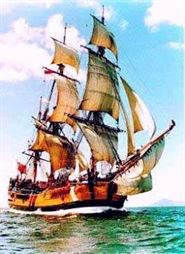 Poem
Poem“The ship was cheered, the harbour cleared,
Merrily did we drop
Below the kirk, below the hill,
Below the lighthouse top.
Word meaning
kirk – church
Explanation of the above poem – The sailor said that their ship left the harbor as everyone was cheerful. As the ship sailed away, they could see the church, the hill and the lighthouse on the hill. It seemed that they sailed from beneath them.
Poem
The sun came up upon the left,
Out of the sea came he!
And he shone bright, and on the right
Went down into the sea.
Word meaning
He: refers to the Sun
Explanation of the above poem – The sailor further said that as they sailed, the sun rose from their left (as Sun rises in the east, it means that they were sailing Southwards). The Sunrise at the horizon seemed as if the Sun was appearing out of the sea. It was a bright and sunny day and finally, at Sunset it again seemed to disappear into the sea.
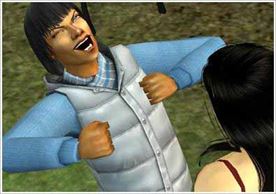
Poem
Higher and higher every day,
Till over the mast at noon-
The Wedding-Guest here beat his breast,
For he heard the loud bassoon
Word meaning
bassoon – a musical instrument
Explanation of the above poem – With each passing day, the Sun would be higher up in the sky and one day it was overhead at noon time which indicates that the ship had reached the equatorial region. The wedding guest heard the loud sound of the bassoon which meant that the wedding ceremony had started. The spell of the mariner broke, and the wedding guest was reminded of the wedding which he had to attend. So, he started beating his chest as a mark of protest.
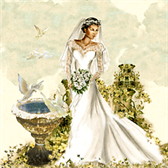 Poem
Poem
The bride hath paced into the hall,
Red as a rose is she;
Nodding their heads before her goes
The merry minstrelsy.
Word meaning
Hath: had
Paced: walked into
minstrelsy – singers and musicians
Explanation of the above poem – The poet describes the scene at the wedding. The bride walked into the hall. She was pretty like a red rose. She was led into the hall by a group of musicians who were playing happy wedding songs.
Poem
The Wedding-Guest he beat his breast,
Yet he cannot choose but hear;
And thus spake on that ancient man,
The bright-eyed Mariner.
Explanation of the above poem – Although the wedding guest protested by beating his chest, still he did not have another option than to listen to the sailor. So, once again, the sailor with shining eyes continued to narrate his story.
Poem
“And now the storm-blast came, and he
Was tyrannous and strong:
He struck with his o’ertaking wings,
And chased us south along.
Word Meaning
tyrannous – cruel, severe, harsh
chased: dragged along
Explanation of the above poem – The sailor continued his story and said that a powerful and harsh storm seized their ship. It dragged their ship along towards the southern direction.
Poem
With sloping masts and dipping prow,
As who pursued with yell and blow
Still treads the shadow of his foe,
And forward bends his head,
The ship drove fast, loud roared the blast,
And southward aye we fled.
Word Meaning
Sloping: slanting
Mast: a tall pole on a ship or boat which supports the sails
prow – the front part of a ship
pursued – chased
treads: walks
foe – enemy
aye: yes
fled: to move swiftly
Explanation of the above poem – The ship had been overpowered by the strong storm. The mast was sloping down and the front part of the ship dipped into the sea due to the pressure of the wind. The ship was forceful, and the roaring sound of the strong wind could be heard. The ship was overshadowed by the storm just like a warrior who sneaks, bends his head forward and tries to escape from the shadow of the powerful enemy. The ship sailed at a fast speed which shows that the wind was intense, and the roaring sound of the wind could be heard. They kept on sailing towards the south direction.
Poem
And now there came both mist and snow,
And it grew wondrous cold:
And ice, mast-high, came floating by,
As green as emerald.
Word Meaning
emerald – a precious stone, which is clear and bright green
Explanation of the above poem – The ship reached the South pole region and it was surrounded by mist and snow. It was very cold. Huge masses of ice which were as tall as the mast of the ship floated by. They were emerald – green in colour.
Poem
And through the drifts the snowy clifts
Did send a dismal sheen:
Nor shapes of men nor beasts we ken-
The ice was all between.
Word Meaning
drifts – floating ice
clifts – steep sides of the ice-bergs
dismal – gloomy, sad
Sheen – a smooth and gentle brightness on the surface of something
ken – see
Explanation of the above poem – The edges of the drifting masses of ice reflected the sunlight with a gloomy shine. The poet calls the shine to be gloomy and sad because as the weather was extremely cold and the Sun was not bright enough, the air was sad and depressing. There was no sign of life. They could not see any person or animal around. They were surrounded by ice.
Poem
The ice was here, the ice was there,
The ice was all around:
It cracked and growled, and roared and howled,
Like noises in a swound!
Word Meaning
Swound: a fainting fit, the act of fainting
Explanation of the above poem – The sailor says that ice was all around them. It made various sounds – it cracked, growled, roared and howled. The noises resembled those made by a person when suffering from a fainting fit.
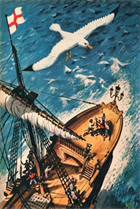
Poem
At length did cross an Albatross,
Through the fog it came;
As it had been a Christian soul,
We hailed it in God’s name.
Word Meaning
Hailed it: welcomed it
Explanation of the above poem – Finally, after a long time, an Albatross bird flew out of the fog. As it is considered to be a holy bird, the ship’s crew welcomed it.
Poem
It ate the food it ne’er had eat,
And round and round it flew.
The ice did split with a thunder-fit;
The helmsman steered us through!
Word Meaning
Split: broke into two parts
Helmsman: the person steering the ship
Explanation of the above poem – The albatross ate the food that the crew fed it. It would fly around the ship. It was a good omen for the ship because with the arrival of the albatross a good thing happened – The ice which had surrounded the ship split into two parts with a loud sound and the ship which had been stuck for so many days started sailing once again.
Poem
And a good south wind sprung up behind;
The Albatross did follow,
And every day, for food or play,
Came to the mariner’s hollo!
Word Meaning
hollo – shout, call
Explanation of the above poem – Also, a favourable wind started blowing from the south direction which helped them sail towards the north. The albatross bird followed the ship on it’s way. It came to the ship for food and to play with the crew whenever the sailor called out for it.
Poem
In mist or cloud, on mast or shroud,
It perched for vespers nine,
Whiles all the night, through fog-smoke white,
Glimmered the white moonshine.”
Word Meaning
shroud – sail
perched – sat on the edge of something
vespers nine – a fixed time every day (the evening church service)
Explanation of the above poem – The albatross would sit on either the mast or the sail of the ship in all the weathers – be there mist or cloud, the bird remained with the ship. It would sit there at a fixed time every day just like the people pray in the church at a fixed time in the evening. All through the night when the sky would be white with the fog and the white moonshine glimmered, the albatross bird remained there around the ship.
Important Videos Links
|
|
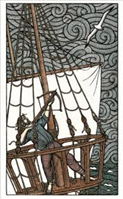
Poem
‘God save thee, ancient Mariner,
From the fiends that plague thee thus!-
Why look’st thou so?’-“With my crossbow
I shot the Albatross.”
Word Meaning
Fiends: evil spirit, devil
plague – to bother, trouble
crossbow – a very powerful bow and arrow, with a trigger
Explanation of the above poem – Suddenly, the sailor’s face became serious and the wedding guest said that God may save the sailor from any evil spirit that had struck him. He asked the sailor that why did he appear so strange and that what had happened. The sailor confessed that he took his bow and arrow and shot the albatross bird dead.
Part II
Poem
“The sun now rose upon the right:
Out of the sea came he,
Still hid in mist, and on the left
Went down into the sea.
Explanation of the above poem – Now, as the ship sailed towards the north, the Sun rose to it’s right. Again, it seemed that the Sun appeared out of the sea. As they were still engulfed in mist, the Sun was not very bright and remained covered by the mist. It set and seemed to disappear into the sea on their left.
Poem
And the good south wind still blew behind,
But no sweet bird did follow,
Nor any day for food or play
Came to the mariners’ hollo!
Word Meaning
Hollo: call
Explanation of the above poem – The favourable wind from the south still blew and helped them sail but the holy bird was not there any longer. As it was dead, it no longer came to the ship for food or to play with the crew at the call of the sailor.
Poem
And I had done a hellish thing,
And it would work’ em woe:
For all averred, I had killed the bird
That made the breeze to blow.
Ah wretch! said they, the bird to slay,
That made the breeze to blow!
Word Meaning
‘em: them
Woe: great unhappiness and sorrow
Averred: said firmly
Slay: kill
Explanation of the above poem – The sailor confessed that he had committed a sin which brought a lot of unhappiness and sorrow. The ship’s crew blamed him for killing the holy bird which was a good omen as it had brought the favourable wind which had helped them sail. They said that the sailor was a criminal as he had killed God’s holy messenger which had made the wind to blow.
Poem
Nor dim nor red, like God’s own head,
The glorious sun uprist:
Then all averred, I had killed the bird
That brought the fog and mist.
‘Twas right, said they, such birds to slay,
That bring the fog and mist.
Word meaning
Purist: rose up
Slay: to kill
Explanation of the above poem – As the ship reached a bit towards the north, the Sun shone appropriately. It was neither dim nor too bright (red in colour). It looked perfect just like the halo surrounding God’s head. The ship’s crew was cheery to see the Sun once again and now it gave an opposing verdict. The crew said that the sailor had killed the bird who had brought fog and mist with it. They said that he was right in killing such a bird which had engulfed them with the depressing fog and mist. (This shows that the crew was fickle minded and changed its opinion according to the changing circumstances).
Poem
The fair breeze blew, the white foam flew,
The furrow followed free;
We were the first that ever burst
Into that silent sea.
Word Meaning
Foam: the bubbles formed on the surface of the sea
Furrow: the track formed behind the ship as it sailed ahead
Explanation of the above poem – As a favourable wind blew, the ship sailed fast. As the ship sailed ahead, it left behind a white – coloured foam in its path on the surface of the sea. The sea was very quiet and there was no sign of life. It seemed that the sailor’s ship was the first to have reached in that part of the world.
Poem
Down dropped the breeze, the sails dropped down,
‘Twas sad as sad could be;
And we did speak only to break
The silence of the sea!
Explanation of the above poem – All of a sudden, the south wind stopped and at the same time, the ship also stopped sailing. The crew became sad as it was stranded in the middle of the sea. The only noise that could be heard in the silent sea was that of the crew members talking to each other.
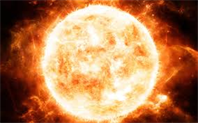 Poem
Poem
All in a hot and copper sky,
The bloody sun, at noon,
Right up above the mast did stand,
No bigger than the moon.
Explanation of the above poem – The weather was very hot, and the sky was full of the copper colour emitted from the hot Sun. The poet addresses the Sun as ‘bloody’ because it seemed to be thirsty for the sweat and blood of the crew. Once again, the Sun was right above the mast – it was overhead which indicates that they were in the equatorial region. The Sun was very huge in size just like the moon.
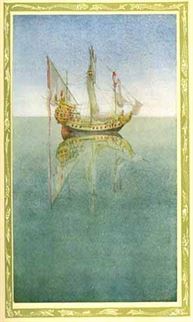
Poem
Day after day, day after day,
We stuck, nor breath nor motion;
As idle as a painted ship
Upon a painted ocean.
Explanation of the above poem – The ship remained stranded in the sea for many days. In a painting, a ship remains still in a still sea. Similarly, the sailor’s ship was motionless in the still sea.
Poem
Water, water, every where,
And all the boards did shrink;
Water, water, every where,
Nor any drop to drink.
Explanation of the above poem – There was water all around the ship. The wooden planks of the ship shrank due to the dry heat of the Sun. The sailors were thirsty as the drinking water had finished. Although there was water all around, they did not have a drop to drink as the sea water was salty and so, it was not fit for drinking.
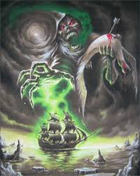
Poem
The very deep did rot: O Christ!
That ever this should be!
Yea, slimy things did crawl with legs
Upon the slimy sea.
Word Meaning
Deep: ocean
Slimy: with slippery bodies
Explanation of the above poem – The sailor prayed to God that he did not want to see that sight again when the deep-sea rotting. There were slippery creatures crawling all around the slippery sea.
Poem
About, about, in reel and rout
The death-fires danced at night;
The water, like a witch’s oils,
Burnt green, and blue, and white.
Word Meaning
reel and rout: types of dances
Explanation of the above poem – It seemed as if the fire of death danced around them doing various types of dances. The sea water was like the oil of a witch which emitted different shades of green, blue and white as it burned. (witch’s oil has been taken from Shakespeare’s play titled ‘Macbeth’ in which the witch burned a magical oil which emitted different colours).
Poem
And some in dreams assured were
Of the Spirit that plagued us so;
Nine fathom deep he had followed us
From the land of mist and snow.
Word Meaning
Spirit: soul of the dead albatross
Fathom: a measurement of depth
Explanation of the above poem – Some of the crew members dreamed that the ghost of the holy albatross had followed their ship to take revenge for it’s murder. It had followed them at a distance of nine fathoms under the sea and had been chasing them from the land of snow and mist where it had been shot dead by the sailor.
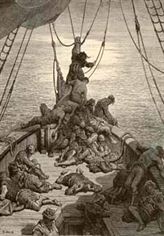 Poem
PoemAnd every tongue, through utter drought,
Was withered at the root;
We could not speak, no more than if
We had been choked with soot.
Word meaning
Drought: a condition of intense heat and lack of water
Withered: lifeless and dry
Soot: solid smoke
Explanation of the above poem – The tongues of all the crew members had dried till the end due to prolonged thirst. They were unable to speak, and their throats were dry as if they were full of dry smoke.
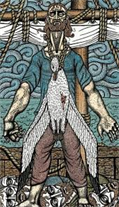
Poem
Ah! well-a-day! what evil looks
Had I from old and young!
Instead of the cross, the Albatross
About my neck was hung.”
Explanation of the above poem – All the crew members of the ship – old and young stared harshly at the sailor. They thought that they were suffering due to the curse bestowed upon them by the holy soul of the albatross. In order to punish the sailor for the sin committed by him, the cross was removed and instead the dead albatross was hung around his neck. It would remind him time and again of the grave sin committed by him.
Top
Literary devices –
1. Alliteration – Below the kirk, below the hill,
Below the lighthouse top (‘b’ sound is repeated)
work ‘em woe (‘w’ sound is repeated)
The fair breeze blew, the white foam flew,
The furrow followed free (‘f’ sound is repeated)
The fair breeze blew, the white foam flew
The furrow followed free
2. Imagery – hot and copper sky (the sky is imagined as a piece of copper), bloody Sun
3. Irony – Water, water, every where,
Nor any drop to drink (although they were surrounded by water, they did not have a drop of water to drink)
4. Metaphor – All in a hot and copper sky,
The bloody sun, at noon, (The sky’s colour has been indirectly compared to the colour of copper. The Sun has been indirectly compared to blood)
5. Onomayoopoeia – The ice ‘cracked and growled,
and roared and howled’
6. Personification – The sun came up upon the left,
Out of the sea came he (The Sun has been personified when addressed as ‘he’)
And now the storm-blast came,
and he was tyrannous and strong: (The storm blast has been personified when addressed as ‘he’)
out of the sea came he (Sun has been personified by addressing it as ‘he’)
The death-fires danced at night; (Fire has been personified when said that it danced)
7. Personification and hyperbole – With sloping masts and dipping prow,
As who pursued with yell and blow
And we did speak only to break
The silence of the sea! (the consequence of their action of speaking has been exaggerated)
Still treads the shadow of his foe (The storm has been shown as a person with a lot of powers which have been exaggerated)
8. Repetition – The ice was here, the ice was there,
The ice was all around (The word ‘ice’ has been repeated to lay emphasis)
Day after day, day after day (to lay emphasis)
9. Rhyme scheme – ab cb.
10. Simile– The Wedding-Guest stood still, And listens like a three years’ child:
The bride hath paced into the hall,
Red as a rose is she (The bride is compared to a red rose)
Nor dim nor red, like God’s own head (The Sun has been compared to the halo surrounding God)
As idle as a painted ship
Upon a painted ocean. (the ship and the sea have been compared to those in a painting)
like a witch’s oils (The sea is dramatically compared to the witch burning oils)
The Rime of the Ancient Mariner FAQs
Q1. Is the Rime of the Ancient Mariner a modern story?
Ans. No, The Rime of the Ancient Mariner is an old story of an ancient sailor.
Q2. What element does The Rime of the Ancient Mariner use?
Ans. The poem incorporates the element of the Supernatural. When the poet describes
The death-fires danced at night;
The water, like a witch’s oils,
Yea, slimy things did crawl with legs
Upon the slimy sea.
These are some of the supernatural elements of the poem.
Q3. How does the poem ‘The Rime of the Ancient Mariner’ start?
Ans. The poem ‘The Rime of the Ancient Mariner’ starts with a wedding party. A group of guests is entering the venue and one of them is stopped by the ancient mariner.
Q4. Who wrote The Rime of Ancient Mariner?
Ans. The poem has been written by Samuel Taylor Coleridge.
Q5. How many parts are in the Rime of the Ancient Mariner?
Ans. The poem is in 7 parts. However, in class 10 Parts 1 and 2 have been included.
Also See:
- Julius Caesar Class 10 English Summary, Explanation, Difficult Words
- Snake Class 10 English Summary, Explanation, Difficult Words
- Ozymandias Class 10 English Summary, Explanation, Difficult Words
- Not Marble, nor the Gilded Monuments Class 10 English Summary, Explanation, Difficult Words
- Poem Mirror Class 10 English Summary, Explanation, Difficult Words
- The Frog and the Nightingale Class 10 English Summary, Explanation, Difficult Words
- VIRTUALLY TRUE Class 10 English Summary, Explanation, Difficult Words
- Two Gentlemen of Verona Class 10 English Summary, Explanation, Difficult Words
- The Letter Class 10 English Summary, Explanation, Difficult Words
- Mrs. Packletide’s Tiger Class 10 English Summary, Explanation, Difficult Words
- Patol Babu, Filmstar Class 10 English Summary, Explanation, Difficult Words
- Shady Plot Class 10 English Summary, Explanation, Difficult Words
- The Dear Departed Class 10 English Summary, Explanation, Difficult Words
- CBSE Class 10 English Communicative Study Guide
- CBSE Class 10 Communicative English Syllabus 2024-25
- Character Sketch of Class 10 English Communicative
- CBSE Class 10 English Communicative word meanings
- Class 10 Communicative English (Important) Questions and Answers
- Descriptive Writing Class 10 Format, Examples
- Email Writing Class 10, 12 Formal, Informal Email Writing Format
- Article Writing for Class 10
